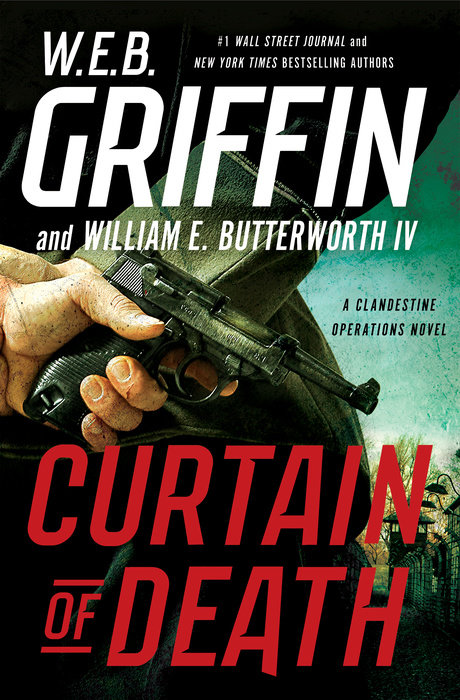
Elise Cooper: Can you tell us what is true in the book?
W.E.B. Griffin: I was there when I was a kid. I knew and saw a lot. The Nazi General Reinhard Gehlen, who became the head of German intelligence in the, 1940s, did work for us to save his people from the Russians. Also true are the Operations OST, Paperclip, and Odessa.
EC: What about the women characters?
W.E.B: We also had many good women who played a prominent role in 1940s Germany as spies and intelligence analysts. Characters in the story like my fictional Claudette Colbert were real and did carry pistols, but the idea of her hiding it in her brassiere was mine. They did this because we could not afford to have them kidnapped. Seven-K was a character I created. She was based on some Mossad agents who did work with us in exchange for getting Zionists out of Russia.
William Butterworth IV: There are fascinating stories of women spies in the Office of Strategic Services (OSS), the predecessor to the CIA, and their missions are the stuff of legend. Yet the contributions made by the 4,000 women, including Julia Child and Marlene Dietrich are largely unheralded. Exceptions include Elizabeth McIntosh’s book Women of the OSS: Sisterhood Of Spies.
EC: Can you explain this quote from the book, “The DCI itself-was that its formation was going to displease the Pentagon, the Navy, the State Department, and the FBI, all of whom had urged the President to disestablish the OSS and have its functions transferred to them.”
W.E.B: President Truman realized putting the OSS out of business was a mistake. He created the DCI under his buddy Rear Admiral Sidney Souers, who formerly worked in insurance. He was in charge for about eighteen months, but then wanted to go back to his profession to make some money. Truman allowed them to do anything they wanted, but they were not allowed to tell anyone else what to do. Unfortunately, there was no cooperation among the units. Truman purposely kept Central Intelligence out of everyone’s hands but his. This caused bureaucratic infighting, because Truman made sure he kept the sole control.
EC: You interject humor in the story?
W.E.B: I love to write humor. If I could make a living doing it that is all I would write. The happiest period of my life is when I was writing the sequels to MASH. I was able to ridicule everyone.
EC: What is the difference between the CIC and the DCI?
IV: CIC is the Counterintelligence Corps and the DCI is the Directorate of Central Intelligence. The DCI is the fictional name in the series for what became the Central Intelligence Agency.
EC: Is the story based on anyone?
IV: Dad said he subconsciously wrote in part, about Rene J. Defourneaux, and called their relationship cousin-like. He was an Army OSS Second Lt. and later became a legendary US Army intelligence officer. Like a lot of highly intelligent spooks he also had a terrific sense of humor. I am intrigued by the history and stories of these men and women.
EC: What is the process you both use to write the books together?
W.E.B: We talk a lot. I send to him a chapter and he tells me what he thinks: ‘don’t do this’ or ‘do this’. One of us will write 90% of a book and the other 10%, and then it reverses with another book. Billy is a very good editor and had been one for sixteen years before we began working together on a daily basis.
IV: Dad lived this period, knew the principles from having worked with General White and others, so he wrote most of this book. And I added what I could. A good editor has an invisible hand in the work, making suggestions and edits that help the story without changing the writer’s distinctive voice.
EC: Speaking of edits, would you ever put in the front of the book a list of characters and their relevance?
IV: I can see it as possibly a companion book, but do not like doing that because it bogs down the story.
THANK YOU!!




